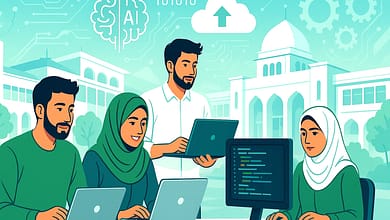
Cybersecurity is becoming more important every day, especially in a world where technology is growing fast. Pakistan, like many other countries, is facing new challenges in keeping its digital world safe.
As we look ahead to 2025 and beyond, it’s important to understand the key trends that will shape the future of cybersecurity in Pakistan.
Table of Contents
1. Increasing Use of Artificial Intelligence (AI) in Cybersecurity
Artificial intelligence, or AI, is a technology that helps machines think and learn like humans. In cybersecurity, AI can be used to detect and stop cyber threats before they cause harm. For example, AI can analyze large amounts of data to find patterns that might indicate a cyberattack.
In Pakistan, the use of AI in cybersecurity is expected to grow by 2025. Many businesses and government organizations are starting to use AI tools to protect their systems. AI can help identify suspicious activities, block malware, and even predict future attacks.
However, there is also a risk that hackers might use AI to create more advanced cyber threats. This means Pakistan will need to invest in AI-based cybersecurity solutions to stay ahead of the game.
2. Rise of Cybercrime and the Need for Stronger Laws
Cybercrime is any illegal activity that happens online, such as hacking, stealing personal information, or spreading viruses. Unfortunately, cybercrime is on the rise in Pakistan. Hackers are becoming more skilled, and they are targeting individuals, businesses, and even government systems.
By 2025, it is expected that cybercrime will become even more common in Pakistan. This is why the country needs stronger laws to fight against cybercriminals.
The government has already introduced some laws, like the Prevention of Electronic Crimes Act (PECA), but more needs to be done. For example, there should be stricter punishments for cybercriminals and better training for law enforcement agencies to handle cybercrime cases.
3. Growing Importance of Data Privacy
Data privacy means keeping personal information safe and secure. With more people using the internet in Pakistan, the amount of personal data being shared online is increasing. This includes things like names, addresses, phone numbers, and even bank details.
By 2025, data privacy will become a major concern in Pakistan. People are becoming more aware of the risks of sharing their personal information online.
Companies and organizations will need to take steps to protect this data. This includes using encryption, which is a way of scrambling data so that only authorized people can read it.
The government may also introduce new regulations to ensure that companies handle personal data responsibly.
4. Expansion of E-Government Services and Cybersecurity Challenges
E-government services are online services provided by the government, such as paying taxes or applying for a passport.
In Pakistan, the government is working to make more services available online to make life easier for citizens. However, this also creates new cybersecurity challenges.
By 2025, as more government services move online, the risk of cyber attacks on these systems will increase. Hackers might try to steal sensitive information or disrupt services.
To prevent this, the government will need to invest in strong cybersecurity measures. This includes training employees, using advanced security tools, and regularly testing systems for vulnerabilities.
5. Increased Focus on Cybersecurity Education and Training
One of the biggest challenges in cybersecurity is the lack of skilled professionals. In Pakistan, there is a growing need for people who understand how to protect digital systems from cyber threats. By 2025, this need will become even more urgent.
To address this, schools, colleges, and universities in Pakistan will need to offer more courses on cybersecurity. Students should be taught how to identify and prevent cyberattacks.
Additionally, businesses and government organizations should provide training for their employees. This will help create a workforce that is ready to tackle the cybersecurity challenges of the future.
6. Adoption of Cloud Computing and Its Security Risks
Cloud computing is a technology that allows people to store and access data over the internet instead of on their own computers.
Many businesses in Pakistan are starting to use cloud computing because it is convenient and cost-effective. However, it also comes with security risks.
By 2025, more companies in Pakistan will likely move their data to the cloud. This means that cybersecurity measures will need to be updated to protect this data.
Companies will need to use strong passwords, enable two-factor authentication, and regularly monitor their cloud systems for any signs of unauthorized access.
7. The Role of Public Awareness in Cybersecurity
Public awareness means educating people about the importance of cybersecurity and how they can protect themselves online. In Pakistan, many people are not aware of the risks of using the internet, such as phishing scams or malware.
By 2025, it will be crucial to increase public awareness about cybersecurity. This can be done through campaigns, workshops, and social media.
People need to know how to create strong passwords, avoid suspicious links, and protect their personal information. When more people are aware of these risks, it will be harder for cybercriminals to succeed.
8. Collaboration Between Government and Private Sector
Cybersecurity is not just the responsibility of the government. The private sector, which includes businesses and organizations, also plays a key role.
By 2025, there will be a greater need for collaboration between the government and the private sector to fight cyber threats.
For example, the government can share information about new cyber threats with businesses, and businesses can help develop new cybersecurity technologies. Working together will make it easier to create a safer digital environment in Pakistan.
9. The Impact of 5G Technology on Cybersecurity
5G is the next generation of internet technology, and it promises faster speeds and better connectivity. Pakistan is expected to adopt 5G technology by 2025. While this will bring many benefits, it will also create new cybersecurity challenges.
With 5G, more devices will be connected to the internet, which means there will be more opportunities for hackers to attack.
To address this, Pakistan will need to develop new cybersecurity strategies that are designed for 5G networks. This includes securing devices, monitoring network traffic, and ensuring that data is encrypted.
10. The Need for International Cooperation in Cybersecurity
Cybersecurity is a global issue, and no country can fight it alone. By 2025, Pakistan will need to work with other countries to share information and resources to combat cyber threats. This includes joining international organizations, participating in cybersecurity conferences, and signing agreements to cooperate on cybersecurity issues.
International cooperation will help Pakistan stay updated on the latest cyber threats and learn from the experiences of other countries. It will also make it easier to track down cybercriminals who operate across borders.
The Bottom Line
The future of cybersecurity in Pakistan is both challenging and exciting. By 2025, we can expect to see new technologies like AI and 5G, as well as new threats like advanced cybercrime. To stay safe, Pakistan will need to invest in cybersecurity education, strengthen its laws, and raise public awareness.
Collaboration between the government and private sector, as well as international cooperation, will also be key.
By taking these steps, Pakistan can build a safer digital future for its citizens. Cybersecurity is not just about technology; it’s about protecting people and their information.
With the right strategies in place, Pakistan can face the challenges of 2025 and beyond with confidence.



